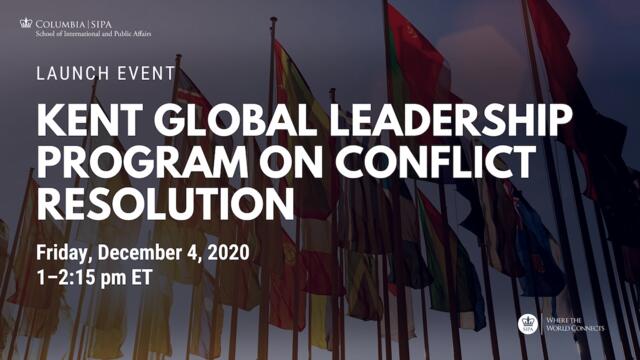
SIPA Celebrates Kent Global Leadership Program on Conflict Resolution

Conflict resolution and its many facets was the subject of a December 4 discussion at SIPA that convened global leaders from multiple sectors, including David Miliband of the International Rescue Committee, UN Under Secretary General Rosemary DiCarlo, and former U.S. Senator Sam Nunn, among others. The conversation marked the ceremonial launch of SIPA’s Kent Global Leadership Program on Conflict Resolution, announced one year earlier.
“SIPA is designed around key challenges in the world,” said Dean Merit E. Janow in her opening remarks. She said the Kent Program, which aims to prepare future leaders to prevent and resolve conflict around the world, reflects this priority.
Professor Edward C. Luck, who directs the specialization in International Conflict Resolution, moderated a conversation that provided diverse perspectives on the global landscape of conflict.
Muhtar Kent, whose $6-million gift last year supports the program, began by sharing his insights. The former chairman of the Coca-Cola Company emphasized the importance of the “golden triangle,” or the cooperation between government, business, and civil society in solving and preventing conflict. He said the distinct expertise from each of these actors coming together is a key part of the Kent Program’s philosophy.
Lakhdar Brahimi, a former United Nations diplomat and founding member of the global peace group The Elders, began his remarks by reflecting on history. History does not unfold in neat logical sequences, he said; it is up to historians to make sense of it. Brahimi pointed out that the end of apartheid in South Africa was around the same time as the devastating Rwandan genocide, demonstrating that even relatively peaceful times in one place can be marred by severe conflict elsewhere.
He shared a handful of key realizations. First, the UN and similar players often go into conflict zones with huge knowledge deficits, and their ability to carry out their mandate suffers from this ignorance. Further, peacebuilders tend to rush into organizing elections and drafting constitutions, sometimes before the country is fully ready. Brahimi also said the UN should do more to help countries build instruments to enforce the rule of law. Finally, he believes there are often more foreigners than necessary and too many UN organizations on the ground, which can prevent meaningful change from taking place.
Sam Nunn, former U.S. senator from Georgia who co-chairs the Nuclear Threat Initiative, took his turn to speak about key systemic and existential threats. The world has the knowledge to create destructive weapons, he said, and thus nuclear weapons must be kept out of the hands of bad actors. He identified cyber warfare as a new form of conflict and increasingly dangerous threat. Nunn also expressed concern over a global breakdown in arms control and lack of strategic nuclear dialogue between nations.
David Miliband, president and CEO of the International Rescue Committee, raised the issue of growing numbers of displaced peoples as a result of violence. He also pointed out that conflicts within states are more common than those between states, as well as proxy conflicts and conflicts in urban areas.
Dina Kawar, Jordanian ambassador to the United States, highlighted key issues in the Middle East, from Syria and Yemen to the Israeli-Palestinian conflict. Her critical insight was the diversity of the region — the varying levels of wealth, governing systems, and political agendas of Middle Eastern nations are key to consider when addressing conflict in the region.
Echoing Kent’s spotlight on the golden triangle, Rosemary DiCarlo, UN under-secretary-general for political and peacebuilding affairs, stressed that the UN is not just for states, it’s also for civil society. “Mediation has to move beyond political and military elites,” she said, emphasizing the importance of involving youth, women, and religious communities in peacebuilding. She shared highlights of UN programs in the Central African Republic, where working with religious leaders and women paved the way for more understanding initiatives that better fulfilled community needs.
DiCarlo also touched on the involvement of the private sector. Recently, the UN has partnered with technology companies as well as academia to host virtual consultations, powered by artificial intelligence, to speak with Yemenis, Libyans, and others impacted by conflict.
As the conversation wrapped up, Miliband encouraged policy schools and students to not be afraid of politics. Policy schools, he said, should expose students to different ways of thinking about politics. Other panelists echoed that conflict resolution and peacebuilding requires responsible political knowledge.
The Kent Global Leadership Program on Conflict Resolution was launched in December 2019 to prepare the next generation of global practitioners to meet the increasingly complex challenges posed by increasing uncertainty and conflict.